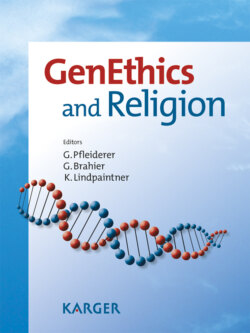GenEthics and Religion

Реклама. ООО «ЛитРес», ИНН: 7719571260.
Оглавление
Группа авторов. GenEthics and Religion
GenEthics and Religion
Contents
Beyond Playing God: Critical Religious GenEthics for Pluralistic Societies
Playing God?
Foundations: Hermeneutic and Conceptional Reflections
The Function of Religion in GenEthical Debates: Critical Analyses
Examining Constructive Efforts of Religious Genethics. Christian Theological Genethics
Jewish, Islamic, and Buddhist GenEthics
Beyond Playing God
Context, Acknowledgments, and Dedication
Footnote
Genes – Cells – Interpretations What Hermeneutics Can Add to Genetics and to Bioethics
Prologue
Hermeneutics
Political Texts
Metaphysical Texts
Who Is the Author of the Genetic Text?
We Do Our Genes
Footnotes
References
Controversies about Human Dignity: Implications for Biotechnology
Introduction
Conception I: HD as a Standard of Duties or Rights
Conception II: HD as a Standard of Virtue
Conflicting Appeals to HD in Public Bioethics: The Example of Human Genetic Enhancement
A Public Precautionary Process
Footnotes
References
Global Bioethics, Theology, and Human Genetic Engineering: The Challenge of Refashioning Human Nature in the Face of Moral and Religious Pluralism
There Is No Substantive Secular Global Bioethics to Guide Human Genetic Engineering
The Plurality of Moralities
The Illusion of Consensus
Separated by Heresy and Disbelief
Always a View from Somewhere
Footnotes
References
Eschewing Images of Man: Against Anthropological Reductionism in Bioethics
Religious Language: Radical Openness to Interpretation
The Dignity of God Seems Not to Be Inviolable: The Abuse of Religious Language in Ethics
Eschewing Images of Man: Against Anthropological Reductionism in Bioethics
References
Children, Bodies, Life: Ethics as the Churches’ Biopolitics
Power of the Churches
Human Life as a Biological Entity
Bioethicization of the Churches’ Positions
Time Factor
Five Theses
Footnotes
References
On the Ethics Debate between Theologians, Scientists and Doctors: Experiences, Observations and Commentaries of a Medical Geneticist
Premises
What, in the View of Doctors or Natural Scientists, Should Theologians Contribute to the Debate?
What Meaning Do Natural Scientists and Doctors Attach to the Terms ‘Facts, Data, Truth’?
Beware of Simplification, Generalization and Polarization
Who May Give the Answers?
Fostering an Interdisciplinary Dialogue
References
‘Biopower’ – Ethical and Theological Considerations
Biopower: Moratorium Instead of Ban?
In vivo Cloning and in vitro Cloning – Biopower in the ‘Politics of Language’
Theological Arguments on the Ethics of Human Genetics
The Anthropological Question: The Ethical ‘Status’ of the Early Embryo
The So-Called ‘Freedom of Procreation’ and the Instrumentalization of Women
References
Further Reading
First Sheep, Then Human Beings? Theological and Ethical Reflections on the Use of Gene Technology
Limits of Nature – Limits of Ethics?
The Right Not to Know
The Right to Natural Birth and Genetic Chance
Is the Human Genome Sacred?
A Rumor Out of Control
Are We Really Playing God?
Is the Gene Myth Warranted?
The Chimera Question
Avoiding Bio-Idolatry
From Nature to Naturalism
References
The Jewish Perspective on GenEthics
Preserving Human Life
Development and Nascent Human Life
Openness to Technology
Conclusion
References
Human Genetic Technologies and Islamic Bioethics
The Fiqh and the Maqasid al-Shariah
New Frontiers in Human Genetics and the Maqasid al-Shariah
Conclusion
References
Buddhism and Human Genome Research
Buddhism and Science
Buddhist Ethics
The Human Genome Project and Human Values
Genetic Manipulation and Human Dignity
Human Cloning and Stem Cell Research
Conclusion
Footnotes
References
Author Index
Subject Index
Отрывок из книги
G. Pfleiderer Basel
G. Brahier Basel
.....
When we now look back on the history of the genetic program we see that it was an attractive preconception about the meaning of the genome drawing on the language of computers, whose attractiveness can be explained in the historical and cultural context in the second half of the 20th century. It was essentially an anticipated story of how the genes work, invented before experimental knowledge in developmental genetics was available. Lily Kay has written the ‘history of the genetic code’ in a book with the ambiguous title ‘Who Wrote the Book of Life?’ [4].
The book of life was meant to be a book written by nature. But it turns out that it is rather written by humans, scientists in particular, but not just by them. We have seen politicians play their role as well. This writing, it emerges, happens not on the level of the genes but on the level of the explanations that have been promulgated and were selected because they seemed to be more meaningful than others.
.....